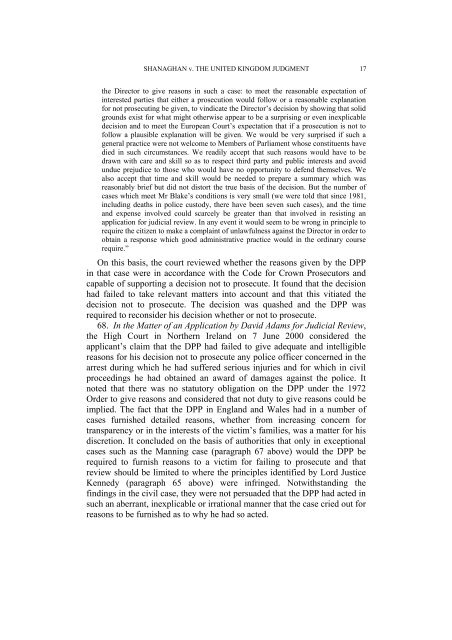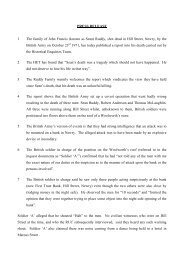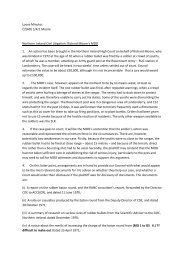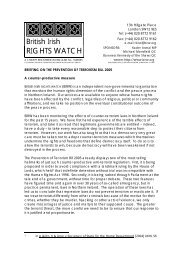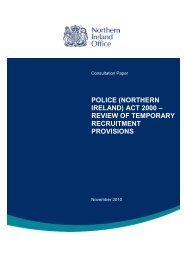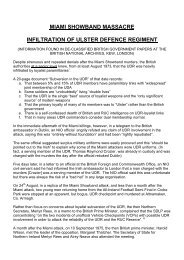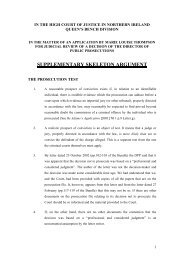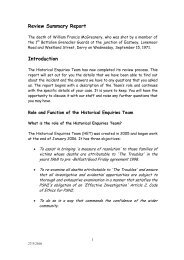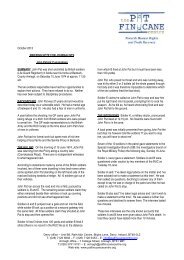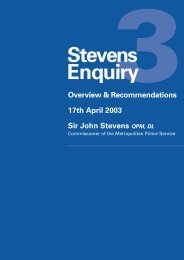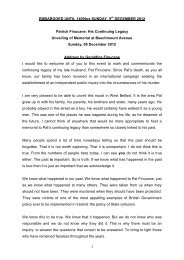Patrick Shanaghan v the United Kingdom - The Pat Finucane Centre
Patrick Shanaghan v the United Kingdom - The Pat Finucane Centre
Patrick Shanaghan v the United Kingdom - The Pat Finucane Centre
You also want an ePaper? Increase the reach of your titles
YUMPU automatically turns print PDFs into web optimized ePapers that Google loves.
SHANAGHAN v. THE UNITED KINGDOM JUDGMENT 17<br />
<strong>the</strong> Director to give reasons in such a case: to meet <strong>the</strong> reasonable expectation of<br />
interested parties that ei<strong>the</strong>r a prosecution would follow or a reasonable explanation<br />
for not prosecuting be given, to vindicate <strong>the</strong> Director’s decision by showing that solid<br />
grounds exist for what might o<strong>the</strong>rwise appear to be a surprising or even inexplicable<br />
decision and to meet <strong>the</strong> European Court’s expectation that if a prosecution is not to<br />
follow a plausible explanation will be given. We would be very surprised if such a<br />
general practice were not welcome to Members of Parliament whose constituents have<br />
died in such circumstances. We readily accept that such reasons would have to be<br />
drawn with care and skill so as to respect third party and public interests and avoid<br />
undue prejudice to those who would have no opportunity to defend <strong>the</strong>mselves. We<br />
also accept that time and skill would be needed to prepare a summary which was<br />
reasonably brief but did not distort <strong>the</strong> true basis of <strong>the</strong> decision. But <strong>the</strong> number of<br />
cases which meet Mr Blake’s conditions is very small (we were told that since 1981,<br />
including deaths in police custody, <strong>the</strong>re have been seven such cases), and <strong>the</strong> time<br />
and expense involved could scarcely be greater than that involved in resisting an<br />
application for judicial review. In any event it would seem to be wrong in principle to<br />
require <strong>the</strong> citizen to make a complaint of unlawfulness against <strong>the</strong> Director in order to<br />
obtain a response which good administrative practice would in <strong>the</strong> ordinary course<br />
require.”<br />
On this basis, <strong>the</strong> court reviewed whe<strong>the</strong>r <strong>the</strong> reasons given by <strong>the</strong> DPP<br />
in that case were in accordance with <strong>the</strong> Code for Crown Prosecutors and<br />
capable of supporting a decision not to prosecute. It found that <strong>the</strong> decision<br />
had failed to take relevant matters into account and that this vitiated <strong>the</strong><br />
decision not to prosecute. <strong>The</strong> decision was quashed and <strong>the</strong> DPP was<br />
required to reconsider his decision whe<strong>the</strong>r or not to prosecute.<br />
68. In <strong>the</strong> Matter of an Application by David Adams for Judicial Review,<br />
<strong>the</strong> High Court in Nor<strong>the</strong>rn Ireland on 7 June 2000 considered <strong>the</strong><br />
applicant’s claim that <strong>the</strong> DPP had failed to give adequate and intelligible<br />
reasons for his decision not to prosecute any police officer concerned in <strong>the</strong><br />
arrest during which he had suffered serious injuries and for which in civil<br />
proceedings he had obtained an award of damages against <strong>the</strong> police. It<br />
noted that <strong>the</strong>re was no statutory obligation on <strong>the</strong> DPP under <strong>the</strong> 1972<br />
Order to give reasons and considered that not duty to give reasons could be<br />
implied. <strong>The</strong> fact that <strong>the</strong> DPP in England and Wales had in a number of<br />
cases furnished detailed reasons, whe<strong>the</strong>r from increasing concern for<br />
transparency or in <strong>the</strong> interests of <strong>the</strong> victim’s families, was a matter for his<br />
discretion. It concluded on <strong>the</strong> basis of authorities that only in exceptional<br />
cases such as <strong>the</strong> Manning case (paragraph 67 above) would <strong>the</strong> DPP be<br />
required to furnish reasons to a victim for failing to prosecute and that<br />
review should be limited to where <strong>the</strong> principles identified by Lord Justice<br />
Kennedy (paragraph 65 above) were infringed. Notwithstanding <strong>the</strong><br />
findings in <strong>the</strong> civil case, <strong>the</strong>y were not persuaded that <strong>the</strong> DPP had acted in<br />
such an aberrant, inexplicable or irrational manner that <strong>the</strong> case cried out for<br />
reasons to be furnished as to why he had so acted.


